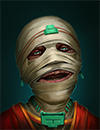Tanah-Chook

|
Beyond this point lie major spoilers for Fallen London, Sunless Sea, Sunless Skies, or Mask of the Rose. This may include endgame or major Fate-locked spoilers. Proceed at your own risk. You can find out more about our spoiler policy here. |
"We have sewers now. Sewers! No one's building them in Venderbight."
Tanah-Chook is a tomb-colony located on an island near Venderbight[1]. Founded by Third City tomb-colonists unhappy with the state of Venderbight[2], this sandstone city is centered around a vast ziggurat that serves as the seat of its leader, but the rest of it is small and really not a tourist attraction. Its only contact with London is via irregular postal exchange, so most on the mainland haven't heard of it at all[3].
Tanah-Chook has few landmarks. Its main marketplace is surprisingly tranquil, and any attempts at theft are born from boredom rather than greed[4][5]. The local tomb-colonists preserve their physical vigor at the House of Exertion, through activities like dance and dueling - both of which are approached with the same level of competition and rivalry[6]. When not such engaged, they can be found keeping their minds busy at the Great Library, a repository of centuries worth of literature. The Library also hosts events like public chess tournaments and concerts, and features a cafe[7].

As the newborn colony began to require proper management, its founders "disappeared," leaving their position to the Ebullient Undertaker.[8] She set up democratic groundwork by allowing three main ways for tomb-colonists to let their weary souls pass on. Either they could ascend to the Surface to see the Sun one last time, move to the Grand Sanatorium in Venderbight as a hospice of sorts, or follow a practice that Tanah-Chook's founders had invented: Emergence, in which a tomb-colonist at the end of their elongated lifespan incubates a frost-moth that eventually bursts from their chest. The Undertaker also proclaimed universal voting rights, for both living and dead. This also includes the permanent dead[9].
All who have chosen their permanent end find themselves on the far shore, a place of (presumably) no return[10]. But even in this state, citizens of Tanah-Chook are still expected to participate in city's political life. This might be accomplished through such means as memorizing pages of reports to update fellow denizens[11], whispering to the dying at the Sanatorium[12], or sending a message in writing on a frost-moth's wings, as these regularly migrate between the Neath and the far shore[13].
References
- ↑ The Post Ship for Tanah-Chook, Fallen London
- ↑ The Port of Tanah-Chook, Fallen London "It is a small republic, formed after a group of colonists rebelled against Venderbight."
- ↑ The Post Ship for Tanah-Chook, Fallen London "The current captain is neither postman, nor tomb-colonist. Occasionally, he'll succumb to loneliness and accept passengers."
- ↑ The Main Marketplace of Tanah-Chook, Fallen London "It is entirely unlike the markets of Spite."
- ↑ Assist the Defenders of the Republic in their work, Fallen London "The Defender of the Republic who takes him from your custody does not detain the thief."
- ↑ Attend a dance, Fallen London "These colonists treat their partners as opponents."
- ↑ The Great Library of Tanah-Chook, Fallen London "The people of Tanah-Chook have had many centuries to accumulate knowledge."
- ↑ Ask the Undertaker about herself, Fallen London "'I went from fresh recruit to leader in three days – I had to, as our old leaders just disappeared.'"
- ↑ Ask about the Republic of Tanah-Chook, Fallen London "'All citizens of Tanah-Chook have a say: the living and the dead.'"
- ↑ Ask about voting and the dead, Fallen London "'It is possible to communicate with the dead. Possible, but slow.'"
- ↑ Ask about voting and the dead, Fallen London "'I send messages with those tomb-colonists who seek the Surface.'"
- ↑ Ask about the moth, Fallen London "'The wretches are so close to the far country they can hear it.'"
- ↑ Ask about voting and the dead, Fallen London "'Frost-Moths migrate to the far country, although their cycle is unpredictable and can take decades.'"